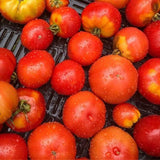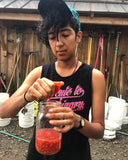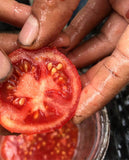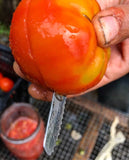Moyamensing Tomato
Solanum lycopersicum
In 1982, William Woys Weaver received seeds for this historic medium red tomato from Mrs. M.J. Grooms, an African American woman living in Philadelphia. Mrs. Groom's great grandfather passed down the seeds through the generations - and for good reason - it's a tried and true heirloom! He had worked as a cook at Eastern State Penitentiary on Fairmount Avenue in the Spring Garden area of Philadelphia, where this variety had been grown by incarcerated workers in the gardens since the mid-1800s. These gardeners shared the seeds with him, and it is likely he used the tomatoes in soups, catchup, and canning in the prison.
In the Eastern State Penitentiary Historic Structures Report (1994), abbreviated notes from 1845 state: "invalid gardens; treatment judged individually; raising tomatoes, 6 gardens, 12 inmates". There was also a "warden's garden", a "domestics' garden", and greenhouses.
Across town in 1855, black abolitionists Harriet Tubman and Frederick Douglass both visited white abolitionist Passmore Williamson in Moyamensing Prison. Williamson worked with William Still and other black leaders of the Underground Railroad and was a member of the Pennsylvania Abolition Society and the Pennsylvania Anti-Slavery Society. Soul Fire Farm grew this seed for Truelove Seeds and in August of 2018, they had this testimony: "Growing these tomatoes and passing down these seeds was an act of resistance and resilience, which we are thinking about as incarcerated people across the country strike against working for low wages and living in dehumanizing conditions in the wake of the death of several incarcerated people at Lee Correctional Institution in South Carolina in April."
Looking back further: the word for tomato comes from the Aztec word "xitomatl" or "tomatl". Tomatoes have been cultivated as food in what is now Mexico since at least around 500 BC, and originate in western South America.
Also known as: Spring Garden Goal Tomato.
Photos by Soul Fire Farm. The photo of tomato plants draped across Soul Fire staff and farmer training program participants is not of this particular tomato, but shows the joy and care that goes into tending to all of their tomato crops, including Moyamensing!
Soul Fire Farm remits 100% of their proceeds from the sales of their seeds to the Stockbridge Munsee Band of the Mohican Nation.
Days to maturity: 85
Seeds per pack: 25
Germination rate: 91% on 03/19/2025
Planting / harvesting notes
Start seeds 6-8 weeks before the last frost and transplant into garden well after the danger of frost. We recommend you prune the suckers that form in the crotches of the branches by the main stem. Water tomatoes at the soil level, keeping the leaves dry. Stake tomatoes so that their leaves and branches are kept off the ground, for good airflow between plants, and for easier harvest.
Seed keeping notes
Tomatoes are generally self-pollinating, though we isolate different varieties by 35-50 feet, in hopes that flying insects will not cross pollinate them unexpectedly. Tomato seeds are ripe when the fruits are ready to eat! Cut the fruit at the equator and squeeze or scrape out seeds from each of the cavities. In a cup or bucket, add a little water (1/2" is probably plenty) to your seeds and pulp to keep them from drying out, and allow them to ferment away from direct sunlight. Ideally, you will stir the concoction every day for 3-5 days. In the end, add more water to fill the vessel, stir one final time, and allow to settle. Pour off the floating material and then strain the seeds through a strainer. Sometimes, you will need to add more water and pour off the floating material several times until the water is clear and you can see the seeds sunken at the bottom. Squeeze dry the strained seeds in a towel, and then lay out to dry on a labeled screen or paper product in a ventilated place away from direct sunlight for a week or two.















